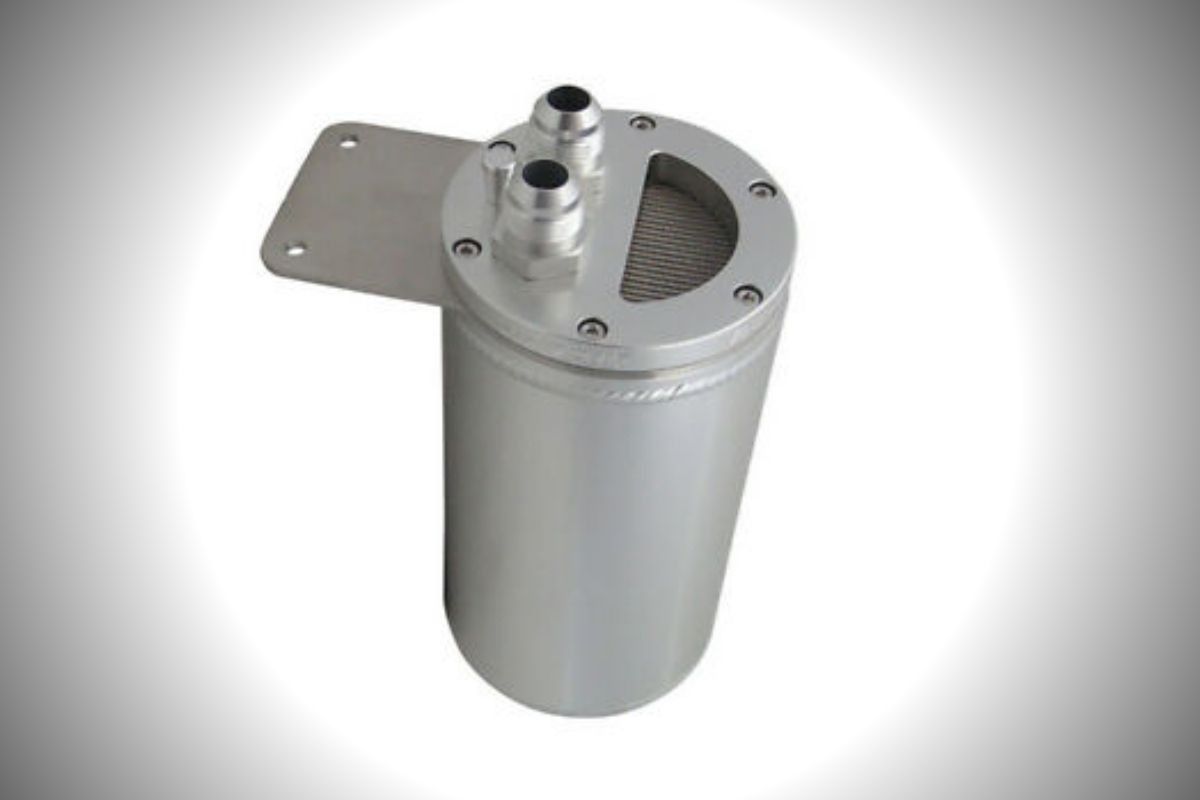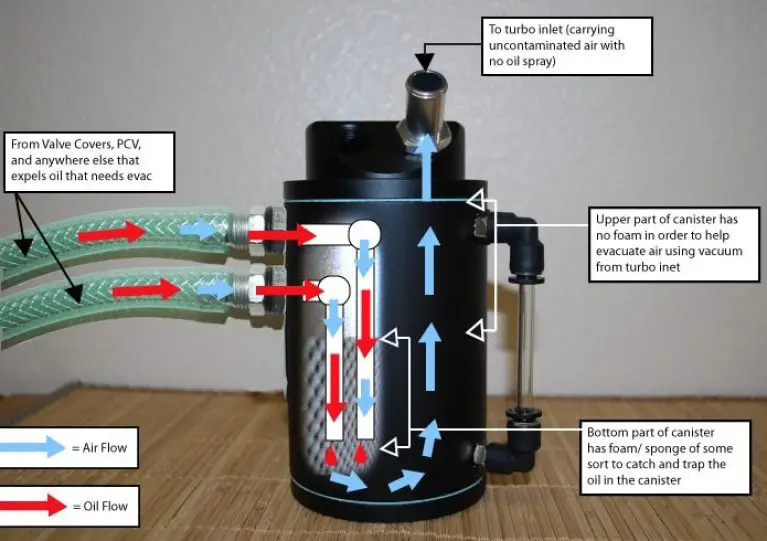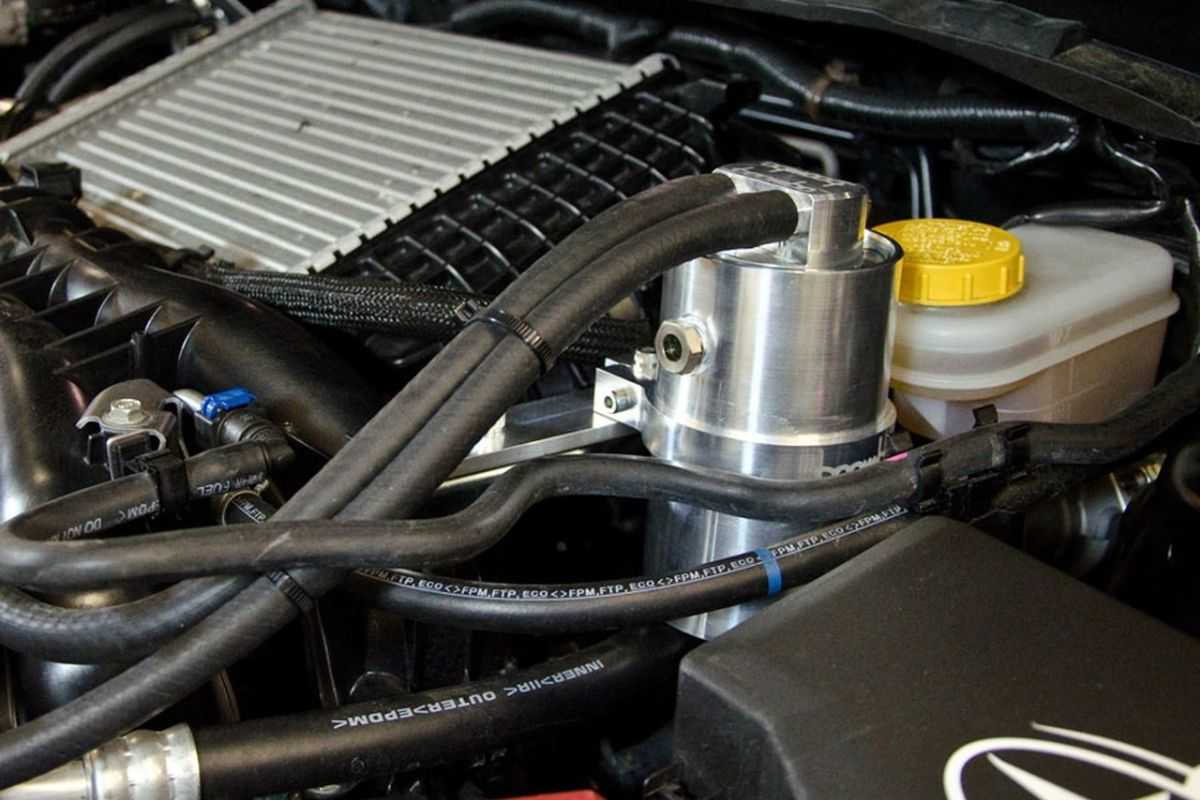
Oil Catch Can Installation Diagram General Wiring Diagram
An oil catch can, which is otherwise known as an oil catch tank, is a device that's connected to a car's crankcase ventilation system which filters out air and other contaminants from the oil. Some select few cars come stock with oil catch cans. These, however, usually have deviations. Take for example the BMW S55 engine's air-oil separator.

How to Install an Oil Catch Can Into Your Car YouTube
Here's how they work, and why you might want to install one on your own car. A typical catch can plugs into a hose running from the top of your engine's crankcase to the intake manifold. This hose.

What is an oil catch can Purposes, Benefits, Pros & Cons
The oil catch can is an important device that helps to protect your car's engine intake from oil and other contaminants buildup. The component is usually installed between the intake manifold and the positive crankcase ventilation (PCV) valve. The device helps to separate microscopic oil droplets away from the crankcase air so that the air.

Oil Catch Can installation YouTube
Yes, oil catch cans are worth it as they can prolong the life of your engine and prevent future maintenance costs. Oil catch cans are aftermarket devices designed to capture oil vapors and prevent them from recirculating back into your engine's air intake system. This can help reduce carbon buildup on the engine's internals and intake.

How To Install An Oil Catch Can YouTube
The oil catch can prevent oil blow-by from returning into the engine's air intake, resulting in detrimental effects. The excess oil accumulates in the can, so it needs to be periodically emptied and cleaned. Oil catch cans are a highly beneficial tool; even a budget product is much better than nothing. A standard catch can connect to a hose.

Oil catch Can Explained ( Do They Really Work ) YouTube
An oil catch can captures the excess oil that passes through the piston seals into the crankcase of your car. Ideally, the oil that lubricates the pistons — necessary for the engine function — is at a precise measure with no waste. But very often the process creates the oily blowby. The oil catch can stops that blowby from going back into.

Oil Catch Cans The Complete Guide Gold Eagle Co.
November 11, 2018. The oil catch tank, otherwise called an oil catch can is a simple device that's fitted into your vehicle's cam/crankcase ventilation system. Having an oil catch can reduces the amount of oil vapors that get recirculated into the engine's intake. Most of the time, you'll only see these in modified vehicles.

How to properly install catch cans, PCV explanation and more! YouTube
The full range of oil catch can benefits include: Carbon Buildup Prevention: Oil catch cans intercept and collect oil vapor and contaminants before entering the engine's intake system. This prevents the buildup of carbon deposits on intake valves, which can hinder airflow, reduce power and negatively affect combustion efficiency. Oil catch cans.

DOES THE OIL CATCH CAN WORK!?!? 6.4L HEMI MUST SEE YouTube
Yes. An oil catch can is a device that helps to prevent oil from entering the engine. It is installed between the engine and the air intake system. The purpose of an oil catch can is to collect oil vapors before they enter the engine. This helps to keep the engine clean and free of deposits. There are many benefits to using an oil catch can.

Video The Importance Of Using A Catch Can System
The oil catch can is necessary for direct injection engines. In port-injected engines, the fuel is sprayed into the intake manifold, and it works as a cleanser. It washes off the oil and reduces debris build-up. However, direct injection engines shoot fuel directly into the cylinder, and there is no buffer or filter to prevent the debris from.

Best Oil Catch Can YouTube
How to Install an Oil Catch Can. Oil catch can installation usually involves the following steps. Step 1: Remove the engine cover and pipe. Step 2: Find the catch can's intended location and secure the bracket. Step 3: Install the fittings onto the catch can and use a thread sealant to prevent leaks. Step 4: Attach pre-formed hoses to the crankcase and intake system.

Do Oil Catch Cans Really Work? YouTube
You see them on tuned cars all the time, yet automakers don't offer them from the factory. Here's why. Peek under the hood of any heavily-modified car, and you're likely to see an oil catch can.

What is an Oil Catch Can and Do They Work? Autowise
Here's how they work, and why you might want to install one on your own car. A typical catch can plugs into a hose running from the top of your engine's crankcase to the intake manifold. This hose.

Pcv Oil Catch Can Diagram DiagramInfo
Oil catch cans are often fitted as an aftermarket accessory to optimise engine performance. They help reduce emissions to ensure a vehicle complies with regulations. They help protect engine parts from contaminants. Also known as oil/air separators, OCCs capture oil droplets or mist from the circulating air in the engine breather and the engine.

What is an oil catch can Purposes, Benefits, Pros & Cons
An oil separator system (also known simply as a " catch can ") is a way to mitigate the harmful effects of engine blow-by. Engine blow-by happens when harmful gasses escape your engine's crankcase and get recycled back through the intake and burned up in your combustion chambers. Problem is, in extreme situations, burning all that oil.

How to install an oil catch can YouTube
As a result, the aftermarket came to the rescue with an item called the catch can. Though it is a small and simple design, the catch can holds mighty powers when it comes to removing contaminants from the intake charge. The crankcase vent air is run through the catch can, which uses baffles or filters to separate the oil from the air, before.
- 12 Liam Street Carina Heights
- Six60 Don T Forget Your Roots Lyrics
- Sgt Schultz I Know Nothing Gif
- Sydney And West Coast Players
- Lemon Scented Gum For Sale
- Chords For Little Lion Man
- Thomas Friends Season 2
- Lyrics To Marry Her Anyway
- Department Stores Perth Western Australia
- Godzilla X Kong The New Empire Scar King